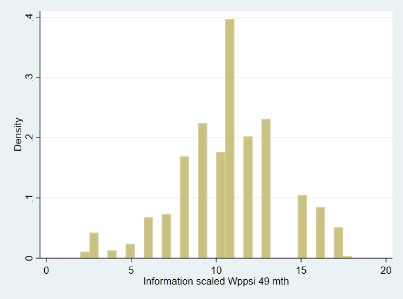The Avon Longitudinal Study of Parents and Children (ALSPAC) assessed their cohort members (CMs) at 49 months’ age (Children in Focus Clinic) using the Information measure from the Wechsler Preschool and Primary Scale of Intelligence Revised (WPPSI-RUK).
Details on this measure and the data collected from the CMs are outlined in the table below.
| Year of data collection: | 1996-1997 |
| Domain: | Verbal ability |
| Measures: | General verbal information |
| Verbal comprehension | |
| Listening ability | |
| Auditory/visual perception | |
| Oral production and fluency | |
| CHC: | Gc (Crystallised intelligence) |
| CLOSER Source: | Explore this sweep in CLOSER Discovery: ALSPAC Early Years (13 months to 4 years 11 months) (opens in a new tab) |
| Administration method: | Trained interviewer; clinical setting; child points to answer, answers orally |
| Procedure: | This test consisted of two parts. For the first part of the test, the child was presented with 6 sets of four images. For each set of images, the child was asked to point to a particular image (e.g. "can you point to the duck"). If the child did not point to the correct picture for the first item, the interviewer demonstrated. The second part of the test consisted of verbal items, in which the child was asked general knowledge questions, e.g. "show me your foot". |
| Link to questionnaire: | http://www.bristol.ac.uk/alspac/researchers/our-data/clinical-measures/ (opens in new tab) |
| Scoring: | Standardised score (M = 10, SD = 3) |
| Item-level variable(s): | Not readily available |
| Total score/derived variable(s): | cf806 Explore this variable in Discovery: ALSPAC Children in Focus 4Mth-61Mth Clinics Dataset (opens in a new tab) |
| Descriptives: | Raw score |
| N = 1,021 | |
| Range = 2 - 18 | |
| Mean = 10.68 | |
| SD = 3.03 | |
(click image to enlarge) |
|
| Age of participants (weeks): | Mean = 212.39 weeks, SD = 1.63, Range = 207 - 221 |
| Other sweep and/or cohort: | ALSPAC – Age 8.5 – WISC-III Information |
| Source: | Wechsler, D. (1989). Wechsler Preschool and Primary Scale of Intelligence-Revised. WPPSI-R. Psychological Corporation. |
| Technical resources: | Kaufman, A. S., & Lichtenberger, E. O. (2000). Essentials of WISC-III and WPPSI-R Assessment. John Wiley & Sons Inc. |
| Example articles: | Gathercole, S. E., Briscoe, J., Thorn, A., Tiffany, C., & ALSPAC Study Team. (2008). Deficits in verbal long-term memory and learning in children with poor phonological short-term memory skills. The Quarterly Journal of Experimental Psychology, 61(3), 474-490. |
| Taylor, C. M., Kordas, K., Golding, J., & Emond, A. M. (2017). Data relating to prenatal lead exposure and child IQ at 4 and 8 years old in the Avon Longitudinal Study of Parents and Children. Neurotoxicology, 62, 224-230. |
For the named item in the table above, a link is provided to the corresponding CLOSER Discovery content.
Go to:
- Overview of all cognitive measures in ALSPAC
- Overview of childhood cognitive measures across all studies
This page is part of CLOSER’s ‘A guide to the cognitive measures in five British birth cohort studies’.
